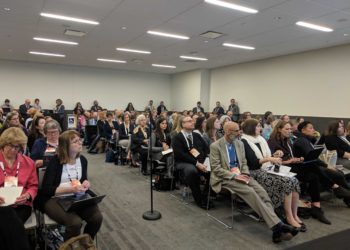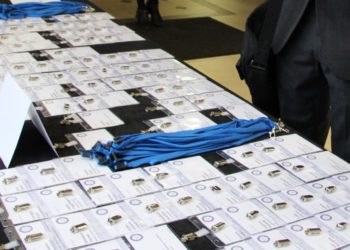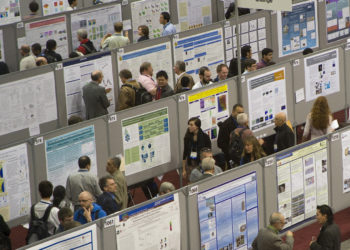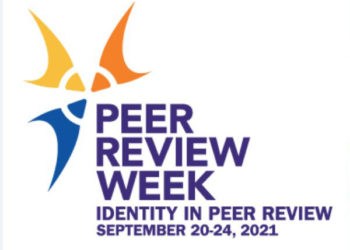Many of us are looking forward to the return of in-person conferences and the opportunity to re-connect with colleagues. The Charleston Conference is leading the way in our field with its November “On the Road Again” conference. I’m registered to attend onsite. You’ll find me helping to facilitate the Society for Scholarly Publishing’s in-person pre-conference on open access books and sharing my thoughts in the “Lively Discussion” with Chefs of The Scholarly Kitchen as well as my research on preprint server accessibility. A browse through the program shows that my fellow Chefs will also be presenting in a number of sessions. Personally, I’m also looking forward to seeing friends, visiting my favorite restaurants, and walking along the battery. As I look ahead to this opportunity, I was thrilled that Leah Hinds, Executive Director of the Charleston Hub, agreed to chat with me about the plans and preparations to ensure a vibrant and safe conference experience for all.

The Charleston Conference is one of the first in our field to hold a hybrid conference — in person and virtual — since the pandemic pivot to fully online. Tell us a little about what went into this decision and the kind of preparations it required?
We decided early on that we wanted to incorporate at least a small in-person attendance option as long as it was safe to do so. The initial thought was to have a relatively low attendance cap, with percentages of the total number of tickets available for attendee types (i.e., 60% librarians, 30% publisher/vendors, etc.) with a max of 5 in-person registrations per vendor or company to prevent all the in-person tickets from being taken up by one or two companies. We have an amazing group of conference directors who put many hours of thought and discussion into the best way to open back up for in-person attendance!
As things progressed with increased vaccination rates, local businesses and venues re-opened at full capacity, and other restrictions were slowly lifted, it became possible for us to remove the attendance caps and go with a more free-form registration process. We’ve worked closely with the staff at all of our venues in Charleston – the Gaillard Center, the Francis Marion Hotel, and the Courtyard by Marriott Historic Downtown – to ensure we’re all on the same page about following CDC guidelines and event planning best practices. The Gaillard led the way with requiring proof of full vaccination or a negative COVID-19 test for entry, one of the first venues in the Lowcountry to do so, and we’re making this applicable for the entire conference event.
Masks will be required for all conference events, and there’s talk of a city-wide mask ordinance that will most likely be in place prior to the start of the conference. Our staff have attended several webinars and training sessions for hosting in-person events in a post-COVID environment, and we’re excited to bring folks back. We have a robust virtual event planned, but there’s nothing that can replicate the serendipitous hallway meetings, bumping into colleagues at coffee breaks, and wandering the booths at the vendor showcase that happens at the conference in person.
What has the response been from the community?
So far, the response has been overwhelmingly positive! Our publisher and vendor colleagues have especially welcomed the opportunity to meet with librarians again, which is one of the main goals of the Charleston Conference – bringing folks together in a friendly, collegial environment without the “us vs. them” mindset. We published a Vendor Showcase Round-up with quotes and photos from several of our vendor showcase exhibitors about their plans for attending. We also have a short video clip with messages from several attendees, speakers, and sponsors about their plans for attending. Charles Watkinson deserves a special mention for his clip, haha – I think it certainly resonates with many of us dealing with working from home with children and pets – as well as yours, Lisa, with the statement that you can’t wait to leave your dining room!
Have you received any criticism of the hybrid model?
No outright criticism, but we did receive many emails and messages asking if we were really and truly going to have a hybrid event! I think many folks expected a transition to a fully virtual event back in mid-August. But we’re confident that we’re taking precautions and following protocols that will allow us to meet safely, and we don’t plan to make any moves to fully virtual unless something drastic happens, like a mandated shut down. I think the flexible attendance options, with all conference sessions available for virtual attendees, is a major factor that helps remove criticism since we’re providing equal access options, as well as the extensive protocols we have in place that I mentioned earlier.
I know you must be monitoring registration closely. How’s it going and are you seeing any trends re who is registering for on-site vs virtual?
Yes, it’s been quite the nail-biter watching the registrations come in! As I’m sure you’ve experienced if you’ve organized any events recently, folks wait until the last minute right up against a deadline before committing and registering. We’ve all experienced the heartbreak and headache of making plans that get altered or outright cancelled in the last year and a half. We’ve tried to take away some of the stress by offering several options for our cancellation policy, including refunds, credits for 2022, and transferring the registration to a colleague.
Things are looking good so far, with around 40% of registrants attending in-person and 60% attending virtually as of this week. We extended the early bird deadline for in-person attendance through Friday, October 8, so numbers are still coming in. And there’s no deadline for virtual registrations so they tend to have a much longer tail with a spike just before the event. We had just shy of 3,000 attendees last year, and we’re on pace to have similar total attendance this year. Katina Strauch, founder and convener of the Charleston Conference, says it will be a nice throwback to earlier years of the conference when attendance numbers were lower and hallways were less crowded, while still having a great way to connect virtually with those who aren’t there in person.
Maybe you can give us a quick overview of the conference and its various components? Are there any components of the conference that are only onsite?
Of course! The conference will run November 1-5, with pre-conferences and vendor showcase-related events on Monday and Tuesday, and main conference sessions and events will be held Wednesday through Friday. Each event will be clearly identified on the agenda as to whether it’s a virtual, in-person, or hybrid event.
All main conference presentations will be available as hybrid events for both in-person and virtual attendees to attend. Some examples of in-person events would be the Vendor Showcase in the Gaillard Center on Tuesday, several pre-conference workshops that will be held on Tuesday, and various social events such as the Annual Conference Reception at the SC Aquarium.
But even for these in-person events, we’re going to have a virtual component of some kind – we have a virtual Vendor Showcase on Monday with a “Talk Now” option to reach booth representatives, and Beth Bernhardt will be doing a live walk-through at the Vendor Showcase in the Gaillard Center on Monday. We’ll offer a similar live walk-through at the SC Aquarium to let virtual attendees see the exhibits, hear the band, and some “person on the street” interviews with in-person attendees and there will be virtual tours and happy hours/receptions available as well. One of our conference directors is even working on the idea of organizing local, small scale get-togethers for virtual attendees so stay tuned for more info on that.
Many of us have also wondered how Charleston is doing as a community that depended on tourism as a significant economic resource. We will find our favorite restaurants, city tours, museums, etc. still holding on?
Since I live about two hours from Charleston, I checked in with several friends and colleagues who live and work in the downtown area to get the inside scoop.
This is from Ariana Pearsall, Sales Manager at the Francis Marion Hotel: “You are correct, Charleston is very tourism driven and in the spring and summer months of 2020 the tourism market was highly impacted due to the mandates to shut down. When the city was given permission to ‘re-open its doors’ and allow for indoor dining as well as sites and attractions to re-open, we definitely experienced an influx of travelers, which we are so grateful for. While we did lose some of our favorite restaurants, the majority of them were able to stay afloat with offering takeout services (including alcohol) or delaying their re-opening date. All city tours, museums and attractions are still here and open for business! Of course all of these outlets do follow the CDC guidelines closely along with those of the state of South Carolina. While we are very sad for the few restaurants that did have to close, the majority of Charleston favorites were fortunate enough to be able to stay open, and I think your attendees will be thrilled to see almost all of them going strong!”
Most of the usual suspects are still there. 39 Rue de Jean, Virginia’s on King, Oku, Halls Chophouse, Basil, Darling Oyster House, High Cotton, Swamp Fox, Proof, Uptown Social, Prohibition, and more are all alive and well. One sad bit of news I found out about recently is that Pane e Vino, a favorite spot since 2006, has relocated from Warren Street to Hollywood, SC, about 45 minutes away from downtown. Word is the vacant spot will be filled by an Indian-American fusion restaurant. The “Explore Charleston” website provides lots of great resources for suggested dining and activities. They did a great write up on “What’s New in Charleston This Fall” with lists of new restaurants as well as updates from existing spots.
When the American Library Association was the first major conference in New Orleans after Hurricane Katrina, many other associations were observing to see how things went. Have you had other conference organizers getting in touch with you to either provide encouragement or ask questions?
Yes, I’ve had a few people reach out, and I think many more are watching to see how things go. I’m always happy to share our process and experiences with others, and it’s always great to compare notes with other events so we can learn from each other! I’m in the process of writing a title for the Charleston Briefings series on running virtual and hybrid events.
What else do you want readers of The Scholarly Kitchen to know about the Charleston Conference?
This will be the 41st year of the conference – Katina Strauch started it in 1980 when she was a newly hired collection development librarian at the College of Charleston with no travel budget. Since she couldn’t travel to attend events, she brought the event to Charleston by inviting a small group of about 25 people to discuss current trends and topics in collection development and acquisitions. Rooted in the tradition of giving the “underdogs” a chance to have a level playing field with the “big dogs,” the Charleston Library Conference continues to place an emphasis on inviting diverse viewpoints, giving a platform to new voices, and equally valuing the input from all sides of the information and scholarly communications industry. We’re excited to see everyone this November, whether you join us in person or virtually. Thanks for the opportunity to share with The Scholarly Kitchen audience!
Discussion
3 Thoughts on "The Charleston Conference — Trailblazing the Return to In-Person Events"
I’m an acquisitions librarian in Canada and the Charleston Conference is my favorite professional event among the many available. I am happy that they are continuing to have a virtual option, as there is absolutely no way that I’m willing to get on any airplane within the US right now, with all the stories about nutcases and violence, not to mention that S. Carolina is a “red state” and the news is constantly full of red-staters being unreasonable about getting vaxxed and obeying masking rules. I miss meeting with vendors in person, and I’m sorry the organizers of this conference have to bear the brunt of the consequences of the millions of their compatriots behaving badly, but those of us who live outside the US have to take care of our own health first.
That’s very smart of you. In our little county in Texas we have 39 folks hospitalized for COVID right now–and everyone thinks this is making great progress, that cases are so low now compared to the height of Delta here. And we are one of the highest vaccinated places in the state, so I would not fly even though I have the booster already.
It seems to us, at the Researcher to Reader Conference, that the key challenge for delivering a valuable online-only event has been how to make it a fully-engaging conference, not just a broadcast webinar (however interesting). This challenge seems to be doubled in a hybrid event. Firstly because surely it is vital to ensure that the online participants don’t feel they are ‘2nd-class citizens’, sitting at home merely watching other people enjoying a full conference. The second demanding element is how to ensure that online and physical participants are not just getting their own full conference experience, whatever their mode of participation, but also find ways that they can interact with delegates and speakers who are ‘in the other mode’, so that it is one single hybrid conference, not a physical event and an online broadcast, that are happening synchronously.
Making this work is the challenge we are setting ourselves, and I look forward to seeing to what extent Charleston is able to demonstrate an early attempt at this.



